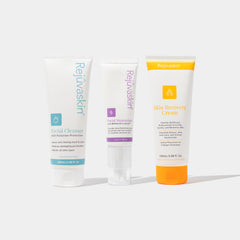When managing eczema or sensitive skin, finding the right treatment can feel daunting. Steroidal creams like hydrocortisone are often the go-to for quick relief, but non-steroidal options are emerging as safer, long-term solutions. This guide dives into the scientific evidence behind hydrocortisone and non-steroidal creams, including Rejuvaskin’s Skin Recovery Cream, to help you make an informed choice.
The Role of a Healthy Skin Barrier in Eczema
Eczema and sensitive skin conditions often stem from a weakened skin barrier. This protective layer keeps irritants, allergens, and bacteria out while retaining moisture. Damage to this barrier can cause dryness, inflammation, and itching.
Scientific studies emphasize the importance of barrier repair in treating eczema. Products with ceramides, hyaluronic acid, and natural anti-inflammatory agents help restore this barrier without the risks associated with steroids (De Waure et al., 2013).
Hydrocortisone: The Steroidal Option
Hydrocortisone is a low-potency corticosteroid that reduces inflammation by suppressing the immune response. It is highly effective for short-term relief from eczema flare-ups. However, prolonged use carries risks, including:
- Skin thinning: A common side effect of corticosteroid use (Goustas et al., 2003).
- Hormonal disruption: Especially in children and sensitive populations (Feiwel et al., 1969).
- Increased susceptibility to infection: Prolonged use can impair the skin's natural defenses (Poyner & Dass, 1996).
Hydrocortisone is best suited for acute inflammation but not ideal for ongoing care or sensitive areas like the face.
Skin Recovery Cream: The Non-Steroidal Solution
Rejuvaskin’s Skin Recovery Cream is a non-steroidal formula designed to hydrate, repair, and calm irritated skin. Key ingredients include:
- Ceramides: Essential for restoring the skin barrier (Xiang, 2003).
- Hyaluronic Acid: Deeply hydrates the skin to reduce dryness.
- Botanical Extracts: Provide anti-inflammatory benefits without the risks of steroids.
Studies show that non-steroidal creams can effectively reduce eczema symptoms over time. For example, a controlled study found that a non-steroidal cream achieved significant clinical improvements, particularly for long-term use, compared to hydrocortisone (De Waure et al., 2013).
Effectiveness: Can Non-Steroidal Creams Compete with Hydrocortisone?
While hydrocortisone provides faster relief for acute symptoms, non-steroidal creams like Skin Recovery Cream offer sustainable, long-term benefits. Research indicates:
- Hydrocortisone: Reduces inflammation quickly but does not repair the skin barrier or support long-term skin health (Goustas et al., 2003).
- Non-Steroidal Creams: Improve skin hydration, repair the barrier, and reduce inflammation without significant side effects (Xiang, 2003).
For everyday use or managing chronic conditions, Skin Recovery Cream is a safer and more versatile choice.
Which Should You Choose?
The choice between hydrocortisone and Skin Recovery Cream depends on your needs. If you’re dealing with a sudden flare-up, hydrocortisone may provide fast relief. For long-term care, barrier repair, and daily hydration, Skin Recovery Cream is the superior, science-backed option. By addressing the root causes of irritation and supporting healthy skin, it offers a safe, effective solution for sensitive skin.
Works Cited
De Waure, C., Cadeddu, C., Venditti, A., Barcella, A., Bigardi, A., Masci, S., ... Ricciardi, W. (2013). Non-steroid treatment for eczema: results from a controlled and randomized study. Giornale italiano di dermatologia e venereologia: organo ufficiale, Societa italiana di dermatologia e sifilografia, 148(5), 471-7. Retrieved from link
Goustas, P., Cork, M. J., & Higson, D. (2003). EumovateTM (clobetasone butyrate 0.05%) cream: a review of clinical efficacy and safety. Journal of Dermatological Treatment, 14, 71-85. Retrieved from link
Xiang, Z. (2003). The clinical efficacy of hydrocortisone buteprate cream in treatment of dermatitis and eczema. Chinese New Drugs Journal. Retrieved from link
Feiwel, M., James, V., & Barnett, E. (1969). Effect of potent topical steroids on plasma-cortisol levels of infants and children with eczema. Lancet, 1(7593), 485-7. Retrieved from link
Poyner, T., & Dass, B. (1996). Comparative efficacy and tolerability of fusidic acid/hydrocortisone cream (Fucidin® H cream) and miconazole/hydrocortisone cream (Daktacort® cream) in infected eczema. Journal of The European Academy of Dermatology and Venereology, 7. Retrieved from link





















Leave a comment